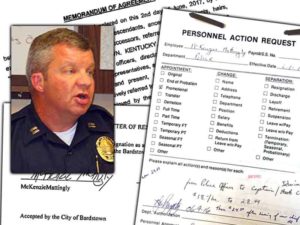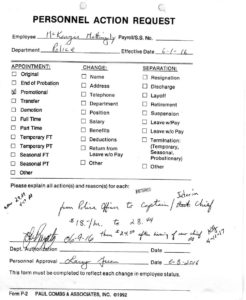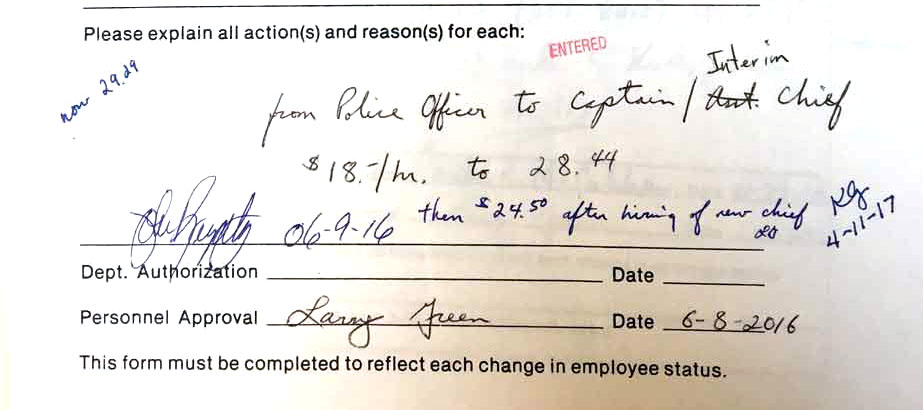Agreement, payment resolves officer’s complaint about retroactive pay cut
By JIM BROOKS
Nelson County Gazette / WBRT Radio
Friday, June 9, 2017, 11:45 p.m. — The agreement signed by Capt. McKenzie Mattingly and the City of Bardstown as part of Mattingly’s resignation also resolves  a pay dispute between Mattingly and City Hall in regard to a pay reduction he received in April 2017 that he was allegedly improperly applied retroactively and without the mayor’s approval.
a pay dispute between Mattingly and City Hall in regard to a pay reduction he received in April 2017 that he was allegedly improperly applied retroactively and without the mayor’s approval.
The six-page agreement — signed by Mattingly June 4, the same date as his resignation — states that in exchange for a payment of $500 from the city, Mattingly agrees to release the city from any other claims regarding the pay dispute. The agreement was part of Mattingly’s personnel file produced in response to a Nelson County Gazette open record request.
- Download and read Mattingly’s agreement (pdf file format)
According to the agreement, Mattingly’s last day as an officer with police powers will be Friday, June 23. At that time, he will surrender his cruiser and other city-owned equipment. He will remain a sworn member of the city police department through July 14, and will collect vacation and sick pay during that time.
Mattingly’s personnel file also included his June 5th demotion to police officer and subsequent pay cut to $18.72, which were approved by Chief Steve Uram and Mayor Dick Heaton.

This personnel action request form indicates the pay increase Mattingly received in June 2016. Click to enlarge (a new window will open).
AGREEMENT RESOLVES PAY ISSUE. Mattingly and former Bardstown Police officer Brad Gillock were both promoted last April at part of former Mayor John Royalty’s restructuring of the police department. Gillock was promoted to lieutenant, and Mattingly to captain. Mattingly was tapped to serve as interim police chief after Chief Rick McCubbin resigned.
The raises accompanying both promotions were not put in place until June 1, 2016, according to notes in Mattingly’s personnel file and statements by Mattingly and Royalty.
Royalty said Thursday Mattingly waived the immediate pay increase in order to focus on department restructuring, which involved creating four supervisory sergeant positions. “It was his decision to do it that way,” Royalty said.
The raises were substantial, but within the appropriate pay range in the city’s compensation plan. Mattingly’s promotion from detective to captain meant an increase from $18 an hour to $28.44 per hour. Gillock’s promotion changed his pay from $17.04 to $24 an hour.
A 3 percent across-the-board raise effective July 1, 2016, boosted Mattingly’s pay to $29.29 per hour.
Mattingly’s pay stayed the same until The Kentucky Standard began asking questions in April 2017 about Mattingly’s pay and overtime records.
According to a story posted on the newspaper’s website on Tuesday, April 11, 2017, Larry Green, the city’s human resources director, said that the the personnel action that raised Mattingly’s pay also stipulated that after a new police chief was hired, Mattingly’s pay would drop to $24.50. However, Green said the intended reduction of Mattingly’s pay never happened.
Mattingly has maintained he was never told his pay would be lowered when a permanent chief was hired. He knew nothing of the pay reduction provision until he saw the pay cut on his check stub following the newspaper’s inquiries, he said.
A black-and-white photocopy of the personnel action request in Mattingly’s personnel file includes a notation that his pay would decrease after a chief is hired, and notes his pay was cut to $24.50 on April 11, 2017 — the date of Green’s interview with the newspaper.
But a color photo of the same document shows that the pay decrease provision was written in a different color ink and apparently at a different time than the original pay change.

This color photo shows the provision to lower Mattingly’s pay after a full-time chief was hired was written in a different color ink and dated April 11, 2017. Click to enlarge (a new window will open).
The added pay-reduction provision was initialed LG and KG — presumably referring to Green and Kerry Greenwell, the city’s chief accountant.
Royalty said when he heard of the cut in Mattingly’s pay he immediately filed a new personnel action that raised Mattingly’s to $29.25, four cents an hour short of what it had been.
The issue was one of fairness, he said. The cut put Mattingly’s pay as captain at a lower rate than the department pay for lieutenant. The cut was also enacted without his approval, Royalty said.
Despite Royalty’s action to prevent Mattingly’s pay cut, the reduction was still applied to Mattingly’s check for the pay period that had just ended prior to the April 11 pay cut. Mattingly wasn’t aware of the change until he later saw his pay stub.
The agreement signed June 2 between and the city’s $500 payment to Mattingly resolves the wage loss issue.
Mattingly began his law enforcement career in Bardstown in 1996. He left in 1999 to join the Jefferson County Police Department prior to its merger with the Louisville Police Department. Mattingly was rehired by Mayor Heaton in 2010 to serve again as an officer in Bardstown.
After announcing Mattingly’s resignation at Tuesday’s city council meeting, Heaton expressed his appreciation for Mattingly’s years of service to the citizens of Bardstown.
-30-






